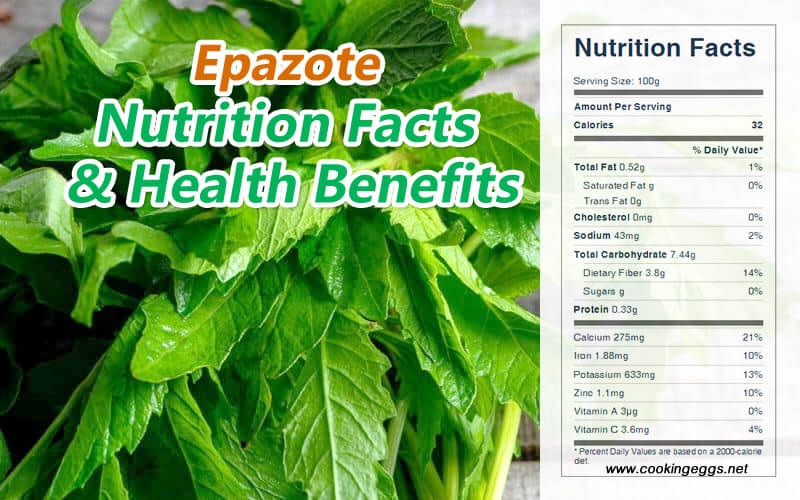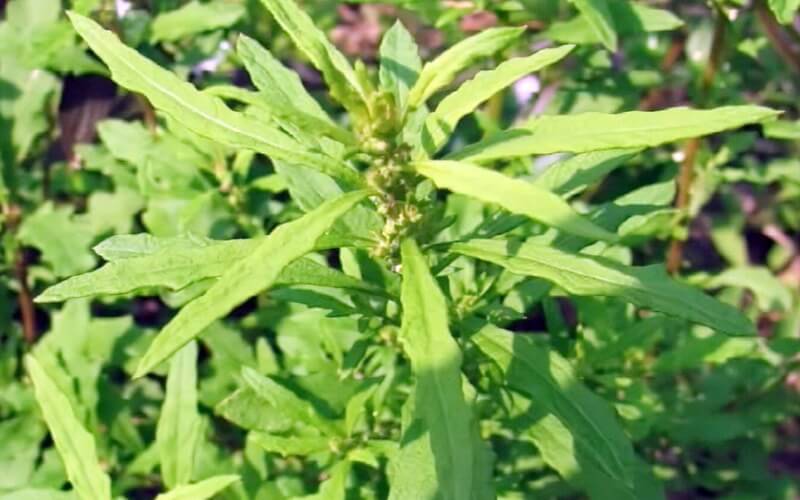Epazote Nutrition Facts and Health Benefits
Warning: A non-numeric value encountered in /www/wwwroot/www.cookingeggs.net/wp-content/plugins/nutrition-facts-label/nutrition-facts-label.php on line 384
Warning: A non-numeric value encountered in /www/wwwroot/www.cookingeggs.net/wp-content/plugins/nutrition-facts-label/nutrition-facts-label.php on line 384
Epazote is a medicinal plant that can be used as a leaf vegetable, herb, or herbal tea. Both the fresh leaves and tender stems can be used in cooking. It is native to Central America, where epazote has been grown for culinary and medicinal purposes for centuries.
Epazote scientific name Dysphania ambrosioides or Chenopodium ambrosioides, also known as Mexican-tea, cashua, wormseed, payqu (paico), or mastruz, is an annual or perennial herb native to Central America and Southern Mexico. The epazote herb is commonly used in the cuisines and traditional medicines of central and southern Mexico and Guatemala.

Nutritional Value of Epazote
Epazote contains lots of vitamins, minerals, and other components. Some of the vitamins that epazote has are vitamin C, vitamin A, riboflavin, thiamin, folate, niacin, pyridoxine, pantothenic acid, and choline. Epazote also contains minerals such as calcium, magnesium, iron, potassium, zinc, copper, and selenium. Epazote also contains Omega 3 fatty acids, Omega 6 fatty acids, and dietary fiber, which have lots of health advantages.
Epazote contains 89% water, 7% carbohydrates, and a small amount of protein and fat. 100 grams of raw epazote provides 32 calories, 7.44 g carbohydrates, 3.8 g fiber, 0.33 g protein, 0.52 g fat, 3 mcg vitamin A, 3.6 mg vitamin C, 275 mg calcium, 1.88 mg iron, 121 mg magnesium, 86 mg phosphorus, 633 mg potassium, 0.19 mg copper, 3.1 mg manganese, 0.9 mcg selenium, and 1.1 mg zinc.
Raw Epazote Nutrition Facts Label
Health Benefits of Epazote
The presence of organic compounds, such as essential oils and phenolic compounds present in epazote, gives the plant some medicinal properties. Studies show that epazote extracts have activity against Leishmania, in vitro antitumor activity and in vivo model against Ehrlich tumor, allelopathic activity, direct action on mitochondria, nematicides, insecticidal activity, antifungals, anti-infammatories, antinociceptives, and healing effects.
Improving Gastrointestinal Health
Epazote contains a significant amount of dietary fiber. It is very beneficial for our digestive health and it also helps to prevent various types of digestive issues. It enhances the gastrointestinal system's efficiency and lowers constipation, bloating, cramping and other serious ailments. Aside from its function as a flavoring, epazote is also purported to reduce the gas and bloating experienced by many when eating beans and cruciferous vegetables.
Bone Health
Epazote contains various amounts of minerals, such as calcium, phosphorous, and potassium, which are essential nutrients for bone health. They are very good for our bone health and help to prevent various types of bone-related diseases, such as osteoporosis.
Hypotension and Vasodilation
Epazote is rich in potassium, which is extremely beneficial for healthy blood pressure levels. Potassium acts as a vasodilator, which means it helps to relax blood vessels, reduces the strain on the cardiovascular system, and encourages circulation and oxygenation to vital parts of the body. Studies show that foods rich in potassium help lower blood pressure and reduce the risk of stroke and cardiovascular disease.
Respiratory Disease Prevention
Epazote can help to prevent respiratory issues like bronchitis, coughs, asthma, bronchitis, and other upper respiratory problems. In traditional medicine, epazote is prepared as a tea or eaten with food. The herb is known to relieve stomach cramps and constipation, as well as respiratory problems stemming from colds, the flu, and asthma.
Antibacterial Activity
Epazote contains high levels of phenol compounds, including quercetin and kaempferol, which possess strong antibacterial activity. One of the many health problems treated with an epazote folk remedy is athlete’s foot. It has been found that epazote indeed inhibits fungi that cause this disease. In addition, soaking epazote leaves in water for a few days, then massaging the infused solution into the skin can be applied topically to treat mild pain like arthritis.
Antiparasitic
Epazote is a Central American herb that has been used for centuries to expel parasitic worms from the body. It can be used for intestinal worms and parasites, or skin parasites, lice, and ringworm. It is very effective against most parasites, including the amoeba that causes dysentery, but is less effective against tapeworm. Its essential oil and its infusion are anthelmintic; the oil is active against intestinal nematodes and the aqueous extract is active against plant nematodes.
Antimalarial Effect
The antimalarial potential of epazote was assessed in vivo, taking into account the survival rate and parasitemia. The study shows that the extract from the leaves of epazote can bind to the total proteins of infected erythrocytes and inhibit the growth of parasites, while in vivo treatment increased the rate of cell survival and decreased parasitemia in infected animals.

Uses in Traditional medicinal
- Epazote is a Central American herb that has been used for centuries to expel parasitic worms from the body. The whole plant is analgesic, antiasthmatic, carminative, stomachic and vermifuge.
- In Brazil, the plant acts mainly in the treatment of worms, against skin disorders, edema, digestive processes, gastritis, menstrual cramps, and stomachaches among others. The plant is also believed to promote, or help, broken bone recovery. To achieve this, fresh leaves are grounded and mixed with hot milk and honey. The resulting mixture is drunk twice a day for as long as necessary to help mend a broken bone.
- In western Spain and northeastern Portugal, the leaves known as Spanish tea are dried and traditionally prepared by infusion, and are used to assist in the treatment of digestive disorders, treatment for eczema, febrifuge, anthelmintic and expectorant.
- Epazote is traditionally recognized in China and Western India by the popular name of wormseed, Mexican tea, and epazote. Consumed in the form of tea, it is traditionally used against worms and parasites, intestinal diseases and to treat rheumatism.
- In New Mexico, suppositories of dried pulverized leaves of epazote, ground spearmint, and salt have been used as a remedy for appendicitis.
- Epazote is sometimes used to repel pests. It has been used to deter insects from eating stored grains. Indochinese farmers mix the fruiting stalks with fertilizer to discourage insect larvae in their crops. In Brazil, the plant is used as a household insect repellent and insecticide.
- Prepared as a tea or eaten with food, the herb is known to relieve stomach cramps and constipation as well as respiratory problems stemming from colds, the flu, and asthma.
- The essential oil from the seed is very effective against most parasites, including the amoeba that causes dysentery, but is less effective against tapeworm. The oil is used externally to treat athlete's foot and insect bites.
Health Risk
- The plant and essential oil should not be used during pregnancy and lactation. Not only does the plant have toxic activity, it has also been traditionally used to induce abortions.
- While epazote has been used by indigenous tribes as a contraceptive, this use is not verified by clinical research (nor should it be relied on for such). However, the use of the plant is probably contraindicated for couples trying to get pregnant.
- The oil of epazote is considered extremely toxic and should not be taken internally.